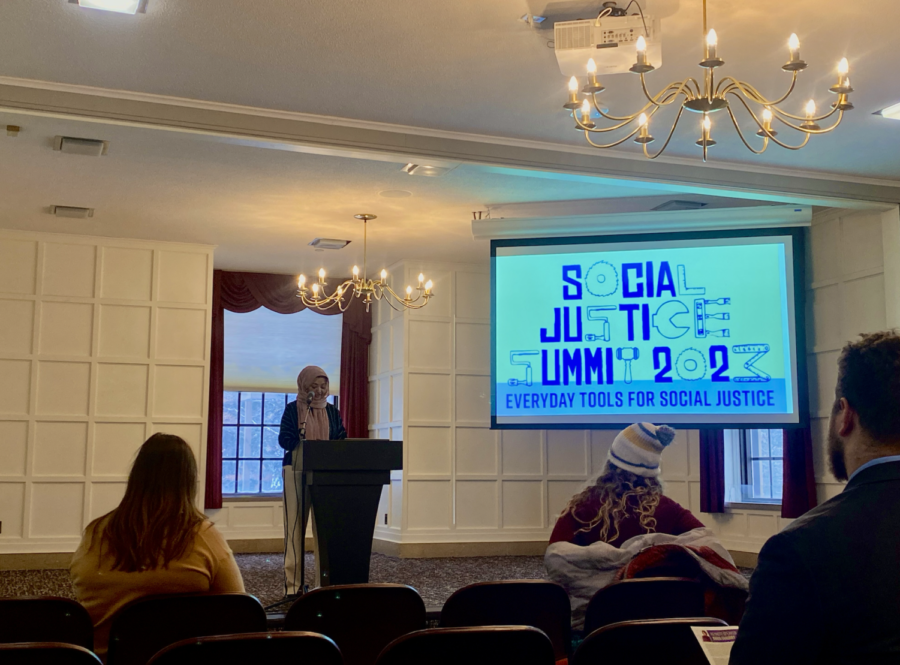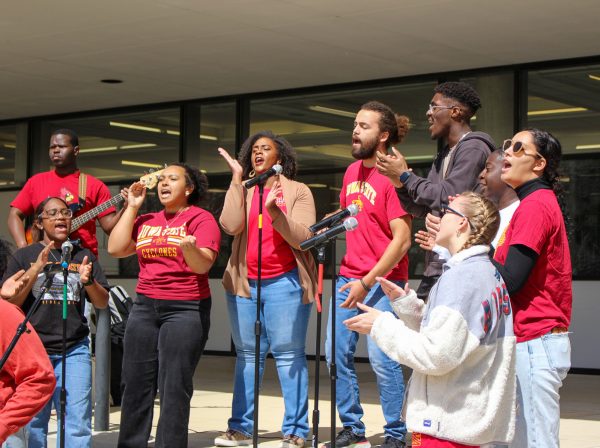‘Me. We. Us.’ Summit provides tools for social justice
The Social Justice Summit took place on Saturday with sessions focusing on individual and community journeys in social justice.
Students and faculty gathered for Iowa State’s annual Social Justice Summit Saturday afternoon to develop tools to create change.
The summit, hosted in the Cardinal Room of the Memorial Union, featured keynote speaker Rabia Chaudry, author of “Adnan’s Story” and “Fatty Fatty Boom Boom,” as well as breakout sessions featuring specific discussions surrounding different aspects of social justice.
“Having the ‘heart of an advocate’ was something the keynote speaker said that really hit me,” said Mia Kawamitsu, a senior in journalism and mass communication. “In continuing my social justice journey, that phrase is one I want to continue to go back on and remind myself that that is who I am.”
Chaudry, an attorney, author and advocate, kicked off the summit with a lecture surrounding discrimination in the criminal justice system, personal anecdotes from her life and work and motivational words for attending activists.
“When you understand your story, you’re going to understand what you’re doing this work for,” Chaudry said. “Knowing your story and learning that your best laid plans will fail are my first two lessons for you.”
After the lecture, participants gathered into different breakout sessions to dive deeper into different features of activism.
“Understanding where we are in our activism journey was a really great tool,” Kawamitsu said, “as well as learning how to effectively hold ourselves accountable on what things we’ve actually been doing.”
The summit featured three breakout sessions: “Me,” “We” and “Us.” These three sessions focused on attendees’ individual social justice journeys, social justice in the community and learning as a group at the summit. Sessions featured themes including awareness of action, active reflection, community change and dealing with burnout.
“It’s much more valuable to be a master of one or two issues instead of a jack of all trades,” Chaudry said. “You cannot focus on every issue all the time, you will burn out. Just know it’s okay to rest.”
Many students shared that Chaudry’s words were relatable and reassuring.
“She had a lot of anecdotes and stories that I could relate to,” Saumya Balaji, a sophomore in environmental science, said. “It was nice hearing from her that it’s okay to take a break.”
Events like the Social Justice Summit aim to give participants tools and social justice awareness. For the past 12 years, the summit has been able to provide participants with the opportunity to engage in discussions about social justice and grow as an activist, according to Hayley Goddard, the student organizations coordinator.
“We’re at a time right now where offering students the opportunity to engage in this type of work is valuable,” Goddard said. “I hope they take away a sense of community and become more comfortable with who they are and what their goals are for social justice.”
In the future, students hope to see more of the Ames community join in with the summit, more keynote speakers with diverse experiences and more student organizations featured within the breakout sessions.
“I encourage you to really find purpose and meaning in the actual work and the journey itself,” Chaudry said. “The glory is in the work, not in the win.”
Your donation will support the student journalists of the Iowa State Daily. Your contribution will allow us to purchase equipment, send our student journalists to conferences and off-set their cost of living so they can continue to do best-in-the-nation work at the Iowa State Daily.
















